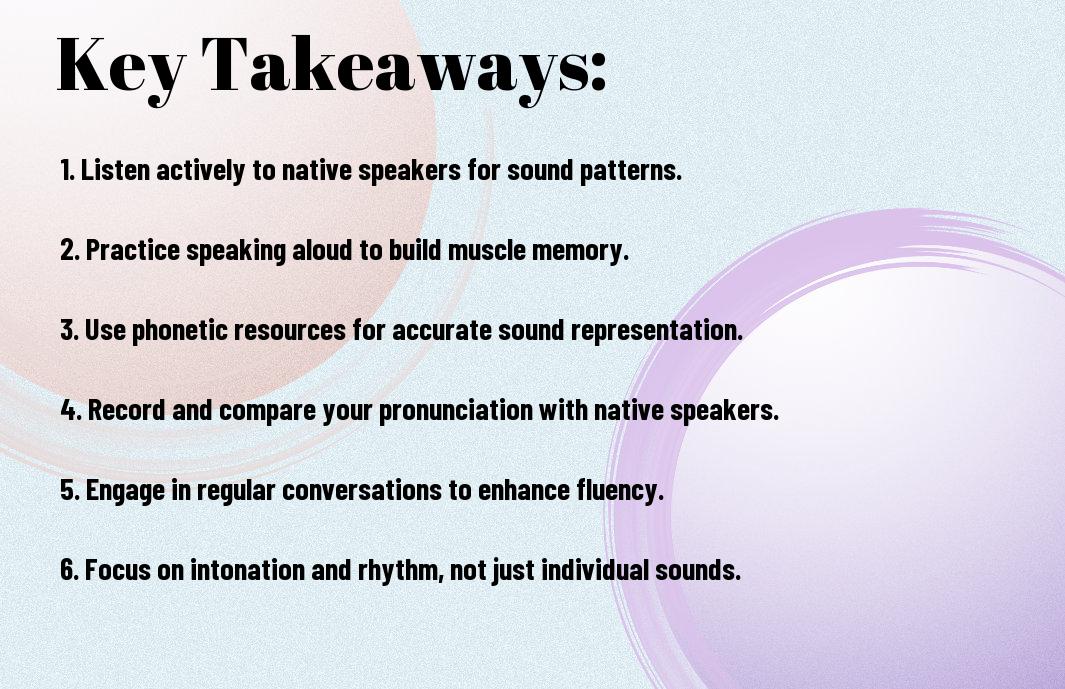As you launch on learning a new language, you’ll find that improving your pronunciation is imperative to effective communication. You’ll want to sound natural and confident when speaking, and with practice, you can achieve this. Your ability to pronounce words correctly will depend on your understanding of the language’s sounds, intonation, and rhythm. By focusing on these aspects, you can enhance your speaking skills and take your language learning to the next level, enabling you to express yourself more accurately and fluently in your new language.

Key Takeaways:
To enhance your skills in speaking a foreign language, focus on the following aspects:
- Develop a regular practice routine to improve your pronunciation by listening to native speakers and repeating what they say to get used to the intonation and pitch.
- Focus on individual sounds and prepare a list of words that contain the sounds you struggle with, practicing them daily to improve your articulation.
- Immerse yourself in the language by watching TV shows or movies, listening to music, and engaging in conversations with native speakers to get accustomed to the hythm and flow of the language.
- Use technology to your advantage by utilizing language learning apps that offer pronunciation correction tools and interactive exercises to help you improve your pronunciation.
- Seek feedback from others, whether it’s a language teacher or a language exchange partner, to identify areas that need improvement and work on correcting your pronunciation.
Setting Goals
To improve your pronunciation in a foreign language, you need to establish a clear direction. Setting specific, achievable goals will help you stay motivated and focused on your objectives.
Defining Pronunciation Objectives
Along with identifying areas that need improvement, you should determine what you want to achieve in terms of pronunciation. Consider what aspects of pronunciation you want to work on, such as intonation, accent, or rhythm.
Creating a Study Plan
With a clear understanding of your goals, you can create a study plan tailored to your needs. You will need to decide on the materials, resources, and activities that will help you achieve your objectives.
It is imperative to break down your study plan into manageable tasks and set realistic deadlines. You can start by allocating specific times for practice, whether it’s daily or weekly, and identifying the resources you will use, such as language learning apps, podcasts, or language exchange partners. By doing so, you will be able to track your progress and make adjustments to your plan as needed, ensuring you stay on track to achieving your pronunciation goals.

Listening and Imitation
It is necessary to listen to native speakers and imitate their pronunciation to improve your language skills. You can find helpful resources, such as 7 Ways to Practice Foreign Language Pronunciation, to guide you in your learning journey.
Exposure to Native Speakers
Against all odds, surrounding yourself with native speakers can significantly enhance your pronunciation. You will pick up on their intonation, rhythm, and speech patterns, allowing you to improve your language skills naturally.
Repeating and Recording
The key to improving pronunciation is consistent practice. You can start by repeating phrases and recording yourself to identify areas that need improvement.
Speakers who take the time to listen to their own recordings can easily pinpoint their mistakes and work on correcting them. You will be able to notice the progress you make over time, which will motivate you to continue practicing and refining your pronunciation skills.
Practice Techniques
For effective pronunciation improvement, you need to practice consistently. You can start by listening to native speakers, repeating words and phrases, and recording yourself to identify areas for improvement.
Speaking with Native Speakers
Around you, there are likely native speakers of the language you’re learning, and speaking with them can help you improve your pronunciation. You can engage in conversations, ask for feedback, and learn from their intonation and rhythm.
Using Language Learning Apps
Applications like language learning tools can aid your pronunciation practice. You can use them to access audio and video materials, practice speaking and listening, and track your progress.
Understanding how to use language learning apps effectively is key to improving your pronunciation. You can start by exploring the app’s features, setting goals, and practicing regularly, which will help you develop your speaking skills and boost your confidence in using the language.
Overcoming Obstacles
Common Pronunciation Challenges
BETWEEN the sounds and intonations, you may find some difficulties in mimicking native speakers, as your native language influences your accent and pronunciation.
Strategies for Improvement
ONE of the most effective ways to improve your pronunciation is to practice consistently, focusing on individual sounds and intonations that are difficult for you.
Overcoming pronunciation challenges takes time and practice, so you need to be patient and persistent. You can start by listening to native speakers, mimicking their intonation and rhythm, and recording yourself to identify areas that need improvement. By following these strategies and staying committed, you can improve your pronunciation and become a more confident speaker in your target language.
Immersion and Consistency
Unlike other language skills, improving pronunciation requires consistent practice. You can learn more about it on How to Improve Your Foreign Language Pronunciation to enhance your skills.
Surrounding Yourself with the Language
By listening to native speakers and engaging with the language daily, you can improve your pronunciation and get used to the sounds and rhythms of the language.
Regular Practice Routine
The key to improving your pronunciation is to practice regularly, setting aside time each day to focus on your language skills and monitor your progress.
Surrounding yourself with the language and practicing regularly will help you develop a routine that will lead to significant improvements in your pronunciation over time, and as you continue to practice, you will become more comfortable and confident in your ability to communicate effectively in your target language.
Feedback and Evaluation
All language learners need to assess their pronunciation to identify areas for improvement. You can use various tools and methods to evaluate your progress and make adjustments accordingly.
Seeking Feedback from Others
Assessment from native speakers or language instructors helps you refine your pronunciation. You can ask them to point out errors and provide suggestions for improvement, enabling you to adjust your pronunciation accordingly.
Self-Assessment and Progress Tracking
Behind every successful language learner is a willingness to track progress. You can record yourself speaking and listen to identify areas that need improvement, helping you to focus your practice.
To effectively track your progress, you use a pronunciation journal to note down difficult sounds, intonations, and rhythms. You can also set achievable goals and celebrate your successes, which will help you stay motivated and committed to improving your pronunciation in the foreign language.
Final Words
Presently, you have acquired knowledge on enhancing your pronunciation skills in a foreign language. You can now practice consistently to improve your accent and intonation. As you progress, your listening and speaking skills will also develop, enabling you to communicate more effectively. By following these tips, you will be able to refine your pronunciation and become a more confident speaker of the foreign language, allowing you to express yourself more accurately and effortlessly in your daily interactions.
FAQ
Q: What is the most effective way to improve pronunciation in a foreign language?
A: To improve pronunciation in a foreign language, it is vital to practice consistently and immerse yourself in the language as much as possible. Listen to native speakers, watch TV shows or movies in the target language, and try to mimic the intonation, rhythm, and individual sounds. You can also use online resources, language learning apps, or work with a language tutor who can provide personalized feedback on your pronunciation.
Q: How can I overcome a strong accent when speaking a foreign language?
A: Overcoming a strong accent requires dedication and regular practice. Start by focusing on the individual sounds of the language that are difficult for you to pronounce. Listen to how native speakers produce these sounds and practice them in isolation before incorporating them into words and sentences. Recording yourself speaking and listening to the recordings can help you identify areas that need improvement. Additionally, try to speak with native speakers as much as possible, as this will help you get used to the natural flow and pronunciation of the language.
Q: Are there any specific techniques or exercises that can help improve pronunciation in a foreign language?
A: Yes, there are several techniques and exercises that can help improve pronunciation. One effective method is shadowing, where you listen to a native speaker and repeat what they say, trying to mimic their intonation, rhythm, and pronunciation as closely as possible. Another technique is to practice tongue twisters or specific phrases that target difficult sounds or intonation patterns. You can also try to practice speaking in front of a mirror, paying attention to the position of your lips, tongue, and jaw when producing different sounds. Using pronunciation practice apps or working with a language exchange partner can also provide you with a variety of exercises and feedback to help you improve your pronunciation skills.
